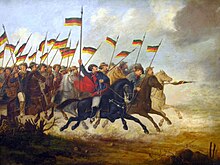Antônio Vicente da Fontoura
[1] As a businessman linked to the ranching interests of Southern Brazil, Fontoura was a fierce critic of the economic policies of the Brazilian central government, which favored the commodity exporting zones of the country to the detriment of the domestic-oriented economy of Rio Grande do Sul.
[2] At the onset of the Ragamuffin War, on September 20, 1835, Fontoura joined the rebels and took over the command of the state militia in Rio Pardo and Cachoeira do Sul.
Elected to the Constitutional Assembly of 1842–43, he progressively became the leader of an opposition party to the main military commander of the uprising, Bento Gonçalves da Silva.
[5] While in Rio, notwithstanding his appeasement attitude, Fontoura refused to kiss the hand of Emperor Pedro II, stating that he was "not yet a Brazilian subject".
[6] Signed on March 1, 1845, the Peace Agreement of Ponche Verde granted amnesty to the Republican leaders, provided financial compensation for Rio Grande do Sul and assured the emancipation of all African slaves serving in the Riograndense Army.
